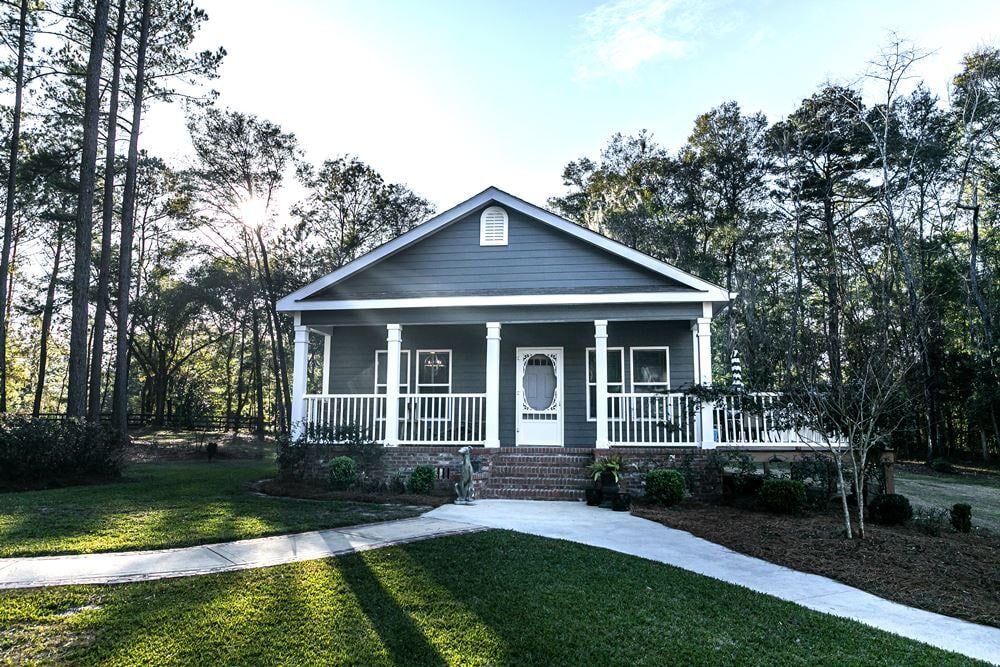What is a Modular Home?
August 26, 2024

In the world of construction, modular homes have been taking off. Also referred to as prefab homes, modular homes are different from traditional site-built homes in several big ways, especially in how they are constructed and the benefits they offer. Understanding what a modular home is, how it differs from other types of homes, and its pros and cons can help you decide whether this type of home is right for you.
A modular home is a type of prefabricated home that is constructed in sections, or modules, in a factory setting. These modules are then transported to the home site and assembled on a permanent foundation. Unlike manufactured homes (or mobile homes), which are built to the HUD Code set by the Department of Housing and Urban Development, modular homes have to comply with the same local, state, and regional building codes as traditional homes. This means that modular homes meet the same safety and quality standards as homes built entirely on-site.
One of the biggest distinctions of modular homes is the speed and efficiency of their construction. Because the modules are built in a controlled factory environment, they’re not affected by weather delays or other disruptions that can affect homes built on-site. This allows for a faster overall construction timeline and can result in cost savings.
How Modular Homes Are Built
The construction process for these homes begins in a factory, where each module is built according to the home’s floor plan. These modules are constructed using the same materials as traditional “stick-built” homes, including wood framing, insulation, and drywall. Once the modules are finished, they’re transported to the home site and assembled on a permanent foundation, which might be made of a concrete slab, crawl space, or concrete block.
After the modules are assembled, the finishing touches—like roofing, siding, and custom fixtures—are added. The result is a home that looks and functions just like a traditional site-built home but with the added benefits of faster construction and often lower costs.
Comparing Modular Homes to Other Types of Homes
Modular homes are often compared to manufactured homes and tiny homes, as well as to traditional site-built homes. But each type of home has its unique characteristics, advantages, and drawbacks.
- Modular Homes vs. Manufactured Homes: While both modular and manufactured homes are built in a factory, the main difference lies in the building codes they must follow. Modular homes are built to meet the same local, state, and regional building codes as site-built homes, ensuring they are held to the same standards of safety and quality. Manufactured homes, on the other hand, are built to the HUD Code, which is a federal standard that may differ from local codes. Manufactured homes are also usually built on a less permanent base and can be relocated, while modular homes are placed on a permanent foundation.
- Modular Homes vs. Tiny Homes: Tiny homes are another type of pre-built home that has gained a lot of popularity recently. These homes are typically much smaller than modular homes, often less than 400 square feet, and are designed for minimalistic living. While modular homes can be customized to be small or large, tiny homes are specifically designed to maximize space efficiency in a very small footprint. Tiny homes might not always comply with local building codes and are sometimes classified as recreational vehicles (RVs) instead of permanent residences.
- Modular Homes vs. Traditional Site-Built Homes: The main difference between modular homes and traditional homes lies in the construction process. While modular homes are built in a factory and assembled on-site, traditional homes are constructed entirely at the home site. This difference in construction method can lead to significant savings in time and cost for modular homes, without sacrificing quality. Both types of homes, however, have to adhere to the same local building codes, ensuring they meet the required standards for safety, durability, and energy efficiency.
Pros and Cons of Modular Homes
Like any type of home, modular homes come with their own set of pros and cons that potential buyers should consider.
Pros:
- Cost-Effective: One of the biggest advantages of modular homes is their cost-effectiveness. Because the modules are built in a factory, there is less waste and lower labor costs, which can lead to significant savings. Additionally, the shorter construction timeline can reduce financing costs and allow homeowners to move in sooner.
- Energy Efficient: Modular homes are often designed with energy efficiency in mind. The factory construction process allows for tighter building envelopes and better insulation, which can result in lower energy bills and a smaller environmental footprint.
- Customizable: Modular homes offer a high degree of customization. Homebuyers can choose from a variety of floor plans and finishes, allowing them to create a home that meets their specific needs and preferences.
- Built to Last: Modular homes are built to the same local, state, and regional building codes as traditional homes, ensuring they are durable and safe. The controlled factory environment also means that the materials used in modular homes are protected from the elements during construction, which can improve the overall quality of the building.
Cons:
- Limited Design Options: While modular homes are customizable, there may be some limitations in terms of design flexibility compared to traditional site-built homes. The need to transport modules to the home site might restrict certain features.
- Financing Challenges: While financing options for modular homes are similar to those for traditional homes, some lenders aren’t as familiar with modular construction, which could lead to challenges in finding a loan.
- Perception and Resale Value: Despite the many advantages of modular homes, many people still assume that they’re lower quality than traditional homes. This assumption can sometimes affect the resale value, although the gap is narrowing as modular homes become more popular and well-understood.